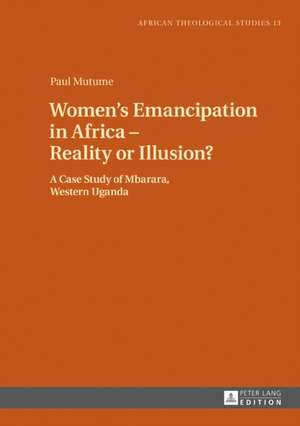Women's Emancipation in Africa - Reality or Illusion?: African Theological Studies / Etudes Theologiques Africaines
Autor Paul Mutumeen Hardback – 15 mai 2017
Preț: 432.78 lei
Preț vechi: 562.05 lei
-23% Nou
Puncte Express: 649
Preț estimativ în valută:
82.81€ • 86.46$ • 68.54£
82.81€ • 86.46$ • 68.54£
Carte tipărită la comandă
Livrare economică 05-19 aprilie
Preluare comenzi: 021 569.72.76
Specificații
ISBN-13: 9783631723029
ISBN-10: 3631723024
Pagini: 226
Dimensiuni: 154 x 213 x 21 mm
Greutate: 0.45 kg
Ediția:Nouă
Editura: Peter Lang Copyright AG
Seria African Theological Studies / Etudes Theologiques Africaines
ISBN-10: 3631723024
Pagini: 226
Dimensiuni: 154 x 213 x 21 mm
Greutate: 0.45 kg
Ediția:Nouă
Editura: Peter Lang Copyright AG
Seria African Theological Studies / Etudes Theologiques Africaines
Notă biografică
Paul Mutume is a Catholic priest of the Archdiocese of Mbarara in Uganda. He holds degrees in Philosophy from Makerere University in Uganda and in Theology from the Pontifical Urban University, Rome, as well as a doctoral degree in Theology from the University of Würzburg in Germany.
Descriere
Women's emancipation in Uganda remains a challenge in a society with a long-held structure of patriarchy and institutional, cultural beliefs. The study critically analyses the institutional mechanisms and concludes suggesting concrete measures and strategies towards gender mainstreaming.











